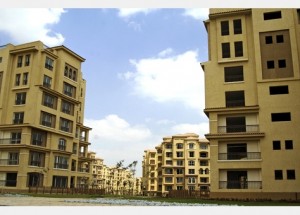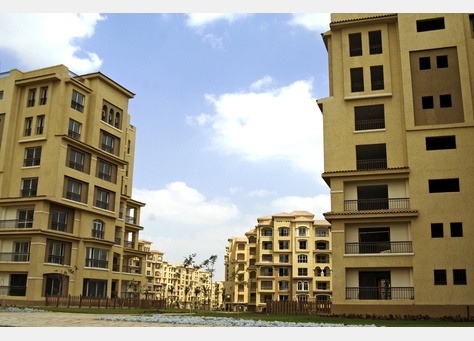
(AFP Photo)
By: Hamada Ismail and Ahmed Samir
Recently, a number of Egypt’s real estate companies, in an attempt to increase sales, stimulate demand and overcome the recent declines in Egypt’s real estate market, have undertaken an innovative advertising campaign to promote investment in housing units for periods of up to five years. These investments would cover the costs energy and electricity for these units via solar panels, provide tenants with free furniture, and extend traditional payment deadlines by several years.
Investors stated that the success of these projects would depend on a number of factors, particularly increases in demand, which would help give the market back its strength.
The new campaigns came as attempts by a number of real estate companies to address problems related to funding, a fact which is largely the result of a decline in the number of sales seen recently throughout the market.
Ali Abd al-Ghafar, President of the Board of Directors for the Dar Zein Real Estate Marketing Company, said that Egyptian real estate companies are continuing to seek new ways to market innovative offers being made within the sector, but that many of these efforts have failed to bear any fruit due to a poor investment environment and continued instability seen throughout the country. For these reasons, a number of clients have postponed making decisions regarding the purchase of real estate.
He added that the fate of real estate companies has had a large effect on recent decreases in sales, pointing out that a number of companies have frozen their operations or removed themselves from Egypt’s market altogether.
This has led to a decrease in the number of private companies operating in Egypt, many of whom specialize in specific forms of real estate. He added that those companies that have the most diverse portfolios are those which have been least likely to fail or witness a decrease in their sales.
Ayhab Youssef, President of the Board of Directors for the Doors Real Estate Company, confirmed that companies hope that these new advertising campaigns will help to stimulate growth in sales, acknowledging however that many of them have been poorly planned and do not meet the demands of the market. New offers to promote investment in housing units for a period of five years he said have unfortunately been considered risky by many, due to the decline in Egypt’s overall economy.
These offers he said contain ideas and incentives drawn from previous offers in order to attract investment, such as the extension of payment deadlines, and the decrease or removal of down payments and direct premiums. However the success of these campaigns require that companies establish terms and conditions for developers, that would guarantee that all legal and administrative issues were addressed prior to the purchase and sale of all units.
He added that now was not the right time to promote such offers, and that he expected the results to be disappointing considering the recent decline in Egypt’s real estate market.
Muhammad Gharib, Marketing Manager for the Amakin Real Estate Development Company, said that many businessmen and investors have left Egypt in favor of Gulf or other Arab markets, due to continued political and economic instability seen throughout the country in addition to protracted security lapses
He added that following the outbreak of Egypt’s 25 January Revolution, many Arab investors bought up large plots of real estate at reduced prices in hopes that the value of these plots would eventually increase, and that large profits could be reaped once the country’s political situation stabilized. However with the prolonged state of Egypt’s economic crisis, many of these investors have taken to re-selling their real estate either at prices equal to or lower than that at which they initially purchased them.
He added that by the beginning of 2012, Arab businessmen had reduced their number of purchases of Egyptian real estate by 95%, compared to the same period in 2011.
He further stated that many real estate companies had gone farther in working to create additional incentives for clients in order to increase demand, such as extending interest free payments deadlines to periods lasting longer than five years, reducing contract deposits and removing interest on premiums.
Despite this however, a number of companies still complained about the lack of new projects available within Egypt’s market capable of attracting foreign investors.
Many have accused Egypt’s government of not doing enough to address the devaluation of the country’s currency in comparison to the dollar, a fact which has subsequently led to price increases for steel and cement, products essential for construction. Clients looking to purchase newly constructed projects however, have largely resisted paying more in order to compensate for the increased costs of building materials.
Shahira Abdullah, Sales Director at the Al-Dar Real Estate Development Company, said that many companies have sought to address this problem by lowering the cost of purchases and extending the length of payment periods, in addition to providing renovated and furnished units to clients free of charge.
She warned that continued economic decline in Egypt would lead to an unprecedented decrease in the amount of foreign investment seen throughout the country, and specifically in Egypt’s real estate market. She confirmed that many companies were moving their operations from Egypt, to either Saudi Arabia or the United Arab Emirates.
She went on to say however that many investors have held onto real estate in hopes that housing prices will eventually rise, or out of fear of suffering high losses as a result of selling real estate during such unstable times.
Abdullah added that some companies have extended their payment periods to as long as 7 years as opposed to 2 or 3 in hopes of attracting new buyers and investors, particularly during the coming summer, which traditionally the most popular period for investors to buy and sell Egyptian real estate.




